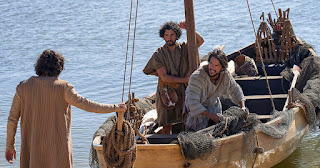Was the Forbidden Fruit a Set-Up?
 |
| Source: Wikimedia Commons |
Disclaimer: I am a participant in the Amazon Services LLC Associates Program, an affiliate advertising program designed to provide a means for sites to earn advertising fees by advertising and linking to Amazon.com. This means my reviews, GCD Picks, and some other posts include links to Amazon in case you want to buy the product after reading my review. If you do make a purchase via my affiliate link, I'll get a few cents.
Introduction
Before I get started discussing the question, there are a couple of things I want to explain. First of all, RCIA stands for the Rite of Christian Initiation for Adults. It is the process by which adults enter into the Catholic Church. A catechumen is someone who is preparing for baptism (as opposed to candidates, who have already been baptized in a Christian church, but are preparing to enter into full communion with the Catholic Church). That being said, Steve is preparing to become Catholic. When he asked this question, he wasn't trying to pick the faith apart; he sincerely wanted to understand the faith better.
Why did God put that tree there?
God placed Adam and Eve in an earthly paradise, the Garden of Eden, and told them they could eat the fruit of any of the trees in the garden save one: the Tree of Knowledge of Good and Evil. So why did God even put that tree there? That is essentially the same question as, "Why did God give us free will?" Because deciding whether or not to eat the forbidden fruit represents the first time Adam and Eve exercised their free will to choose between obeying and disobeying God. (Note that I'm not saying the Tree and the Fruit are only symbolic; I'm saying that they also represent larger ideas than just a physical tree and a physical fruit.)
The reason that God gave us free will is that he desires love from us, not blind obedience. I could program my computer to say "I love you" every time I log on, but that doesn't mean my computer loves me. I'm reminded of the account of the creation of the dwarves in J.R.R. Tolkien's The Silmarillion. The angelic(ish) being Aulë can't wait for the Children of Ilúvatar (Men and Elves, whom Ilúvatar/God has promised to create), so he tries to create them himself. The resulting creatures, the Dwarves, can only do exactly what Aulë wills. In fact, they are only animated when Aulë is focusing on them. Ilúvatar/God confronts Aulë about this, and asks if he really wants mindless drones. Aulë repents, because what he really desired was relationship with the Children of Ilúvatar. Because of Aulë's repentance, Ilúvatar/God gives the Dwarves life, but puts them to sleep until an appointed time. The morals of the story is 1) God wants his creatures to be free, not robotically obedient, and 2) we should trust in God to provide for us, instead of grasping illicitly for what we think we need (I'll come back to that point later).
So in order for us to be capable of loving God, we have to be able to freely choose him. And being able to choose means there must exist an alternative. So one reason God put a tree with forbidden fruit in the garden was that he wanted Adam and Eve to freely choose Him over temptation.
The other reason God put the Tree there gets back to that second moral of the story of Aulë and the Dwarves. He gave Adam and Eve everything they needed in the garden, and they should have trusted Him to provide for them. But Adam and Eve decided that they needed knowledge of good and evil, and they were convinced by the serpent that they could attain this knowledge without God (in fact, they were convinced that God would not give them this knowledge). Instead of relying on God, they decided to rely on themselves.
When Jesus is tempted by Satan in the desert, Satan tries to convince Him to turn stones into bread. But Jesus responds that He will trust in God to provide for him. One of the reasons the Church pairs the account of the fall of Adam and Eve with the temptation of Jesus in the readings for the First Sunday of Lent is to draw attention to this contrast. Jesus Christ shows us that we should trust in God, even when we are tempted to reject God and trust only in ourselves.
O happy fault!
A separate - but related - question to why God gave Adam and Eve a choice, is the question, "Why does God allow evil things to happen?" The question of why God allows suffering opens a whole can of worms, and it's one I am exploring in the book I'm writing about miscarriage from a father's perspective. Today, we'll just focus on why God allows sin. And that is, so that he may bring about a greater good. The sin of Adam and Eve ultimately led to humanity's redemption by Jesus Christ. As the Exsultet (the song proclaimed at the Easter Vigil Mass) puts it, "O happy fault that earned so great, so glorious a Redeemer!" In a way, God's love for us is clearer and more beautiful because we so desperately need it to save us from our sin. We come to understand God's mercy through the eucatastrophe of His intervention in human history.
We must be careful, though, not to take this to mean that we are justified in sinning in order to make our own redemption more profound. I'm now reminded of the work of another Inkling, C.S. Lewis's Perelandra, a science fiction novel with deep theological themes. If The Chronicles of Narnia is an allegorical retelling of the Gospel, the Space Trilogy (of which Perelandra is the second book) is an extrapolation of salvation history out into the rest of the solar system. In Perelandra, the protagonist, a professor named Ransom, finds himself on Venus, where a new sentient species has been created. The first woman on Venus is tempted by Weston, a representative of Satan, and it is Ransom's job to prevent her from succumbing to temptation. One of the arguments Weston makes is that since the Fall of Man on Earth led to the Incarnation, then God must want His creatures to rebel, so that they can come to appreciate Him more.
Similarly, it would be wrong to commit a sin and think, "Well, God will forgive me, so it's not big deal." Either of these would be to commit an additional sin, the sin of presumption. This is the second way Satan tried to tempt Jesus in the desert, by telling him to throw himself down from a cliff, trusting that angels would "bear him up, lest he dash his foot against a stone." We must not deliberately sin, counting on God to forgive us, because to do that would miss the whole point of repentance - namely, turning away from one's sins.
Is God responsible?
Finally, I'd like to go back to the premise of the original question. Steve asked, "Isn't God responsible for everything that happened?" Behind this question is an underlying assumption, one that is almost inevitable in our secular society. It is assumed that our actions are determined by a combination of genetics, the way we were raised, the culture we live in, and our past experiences. Therefore, nothing is really our "fault," per se. But this assumption is rooted in materialism. It doesn't take into account our immortal souls. The factors listed above do have an impact on the choices we make; they can even mitigate some of our responsibility. But ultimately, we have the ability to choose. Thus, to say the Fall of Man was God's fault is to deny the reality that Adam and Eve made free choices, and were responsible for these choices and their outcomes.
Conclusion
There are many other ideas to explore related to this question, but I feel I've rambled on long enough (with plenty of geeky tangents). To delve into anymore avenues of thought would require that my readers still be awake. So we'll leave it as it is. God gives us free will; He brings good even from our bad choices, and we are responsible for the choices we make.
Catholic Pick: Catholic Answers Live
I've been very blessed to have received a lot of formation in my Catholic faith, from my parents and teachers, to books written by Saints or other Catholic and Christian thinkers. At this stage in my life, one of my main sources of Catholic teachings and discussion has been the various podcasts I consume. I've mentioned some of these podcasts in previous posts (check out the GCD Picks page for a list of past picks). One podcast I haven't discussed yet is the Catholic Answers Live Podcast.
This podcast makes available for download the daily radio show Catholic Answers Live, which airs on Catholic radio stations on weekday evenings. Catholic Answers Live is a call-in show hosted by Cy Kellett. Each show has a guest who fields questions from callers about a variety of topics. Topics in the past have included bio-ethics, difficult Scripture passages, parenting, suffering, and the historicity of Scripture. They also frequently do shows where the only allow non-Catholic callers, or atheists, or people who disagree with Catholic moral teaching.
I've learned a lot from listening to Catholic Answers Live - not only answers to the specific questions asked on the show, but also how to think critically, and come up with these answers myself. How to interpret Scripture and Church teaching with what Pope Benedict called a "hermeneutic of continuity," instead of assuming that a certain Bible verse or Church document contradicts breaks with the rest of Catholic teaching.
You can find episodes of Catholic Answers Live, as well as information about when it airs in your area, at their website: Catholic.com/audio.
Thanks for reading! If you like my blog, and you'd like to receive emails each time I upload a new post, you can enter your email address below. Or, you can "Like" or "Follow" GCD's Facebook page here. Find me on Twitter here. If you want to express an opinion, ask a question, or give feedback about this post or others, feel free to leave a comment below, or email me at geekycatholicdad@gmail.com.
If you would like to send a few pennies my way (which I use to pay for hosting the site), you can use my Amazon links to purchase any of the items I have recommended, or anything at all from Amazon. Alternatively, you can click the Amazon link here, and then proceed with your Amazon shopping.



Comments
Post a Comment